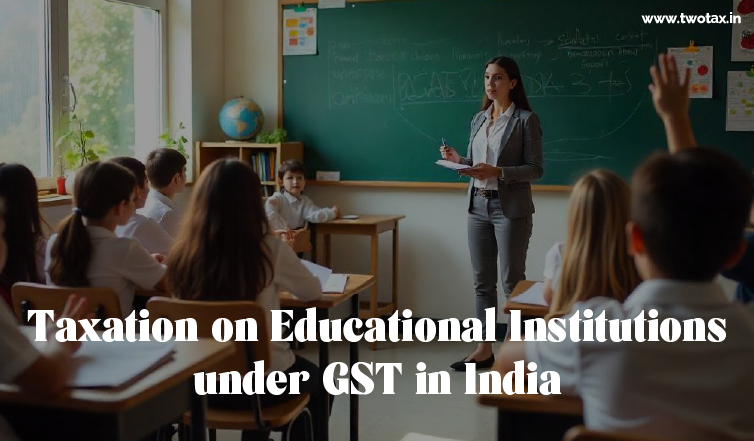Connect with us for all your queries



Imagine a bustling coaching institute in Delhi, where students prepare rigorously for competitive exams. The institute has been running smoothly for years, but one day, they receive a tax notice—an 18% GST levy on their services. Panic sets in. Are they classified as an "educational institution" under GST? Should they have been charging tax all along?
Across town, a prestigious university affiliates a private college, assuming their affiliation services are tax-free—only to discover that a recent GST ruling now makes them taxable. Meanwhile, a medical institute constructing a new hostel wonders: Will this project attract GST, or is it exempt?
The taxation of educational institutions under GST in India is a complex maze, with exemptions for some services and taxes for others. From coaching centers and university affiliations to hostel construction, each case brings unique challenges. This blog will unravel the GST framework for educational institutions, the exemptions available, taxable services, and key legal rulings that are shaping the future of education taxation in India.
Education plays a vital role in shaping the future of a nation. Recognizing its importance, the Government of India has introduced several exemptions under the Goods and Services Tax (GST) regime to minimize the tax burden on educational institutions. However, not all educational services are exempt from GST. Understanding the taxation framework applicable to educational institutions is crucial for compliance and financial planning.
In this blog, we will explore the GST implications on educational institutions, exemptions available, taxation of auxiliary services, and key legal rulings.
Pre-school education and education up to higher secondary school.
Education as a part of a curriculum leading to a recognized qualification.
Vocational training or skill development programs approved by the government.
The following services provided by educational institutions are exempt from GST:
Tuition and admission fees for courses leading to recognized qualifications.
Transportation services for students, faculty, and staff.
Examination and assessment services.
Hostel accommodation (if charges are below ₹1000 per day per person).
Supply of study material (NCERT books and printed question papers).
Not all educational services enjoy GST exemption. The following services are taxable under GST:
Private coaching and training institutes (taxed at 18%).
Online education services, including e-learning platforms (taxed at 18%).
Renting of premises by educational institutions to third-party vendors (taxed at 18%).
Canteen/mess services, if outsourced to a third party (taxed at 5% or 18%).
Transportation services provided by third-party vendors (taxed at 5% or 18%).
Input Tax Credit (ITC) allows businesses to reduce their GST liability by claiming credit on taxes paid for inputs. However, educational institutions providing only exempt services cannot claim ITC.
ITC Applicability
If an institution provides both exempt and taxable services, ITC can be claimed only for taxable services.
Institutions involved in commercial activities, such as renting out premises or offering training programs, can avail ITC on expenses related to such activities.
Issue: Whether NIBM’s banking training programs qualified for GST exemption.
Ruling: Exemption denied. The tribunal ruled that only institutions offering formal degrees or curriculum-based education under recognized laws (e.g., UGC, AICTE) qualify as "educational institutions" under GST law. Vocational programs without formal accreditation are taxable at 18% GST.
Impact: Clarifies that non-accredited vocational training falls under taxable "commercial training."
Issue: GST applicability on university affiliation services (e.g., infrastructure/faculty audits for colleges).
Ruling: Affiliation services by universities to colleges are taxable at 18% GST, overriding earlier exemptions. Exemption applies only to government schools from October 2024.
Impact: Universities and colleges must now factor GST into affiliation fees, raising operational costs for private institutions.
Issue: Whether GST applies to hostel construction for educational institutions.
Ruling: Construction of hostel buildings for educational institutions is exempt from GST as it qualifies as "construction of civil structures for educational purposes" under GST exemption clauses.
Impact: Reduces financial burden on institutions expanding infrastructure.
Issue: GST applicability on coaching for competitive exams (e.g., UPSC, CAT).
Ruling: Services classified as “commercial training,” attracting 18% GST. Coaching centers must register, file returns (GSTR-1, GSTR-3B), and pay taxes.
Impact: Coaching centers face higher compliance costs, with fees likely rising for students.
Clarification: Affiliation services by universities/boards to colleges/schools are taxable at 18%, except for government schools.
Outcome: Ended ambiguity around exemptions for affiliation services, ensuring uniform tax treatment.
Exemption: Research and development services by government entities, universities, or colleges are GST-exempt if aimed at public welfare.
Impact: Supports academic research but limits exemptions to non-commercial projects.
| Service | GST Rate | Exemption Criteria |
| University affiliation services | 18% | Exempt for government schools only |
| Vocational training | 18% | Only accredited programs exempt |
| Hostel construction | 0% | Linked to educational infrastructure |
| Private coaching | 18% | Always taxable |
Definition of "Educational Institution": Strictly limited to entities offering formal, accredited education (pre-school to higher secondary).
Affiliation Fees: Now taxable unless provided to government schools.
Infrastructure Projects: GST exemptions apply only to directly related educational infrastructure (e.g., hostels, classrooms).
To ensure compliance, institutions must:
Reclassify taxable/non-taxable services.
File GSTR-1 and GSTR-3B for taxable activities.
Maintain records for GST audits.
The GST framework for educational institutions in India is designed to ensure that basic education remains affordable while commercial activities are appropriately taxed. While core educational services enjoy exemptions, institutions offering auxiliary or commercial services must comply with GST regulations.
To optimize compliance, educational institutions should:
Tax Partner is India’s most reliable online business service platform, dedicated to helping you in starting, growing, & flourishing your business with our wide array of expert services at a very affordable cost.